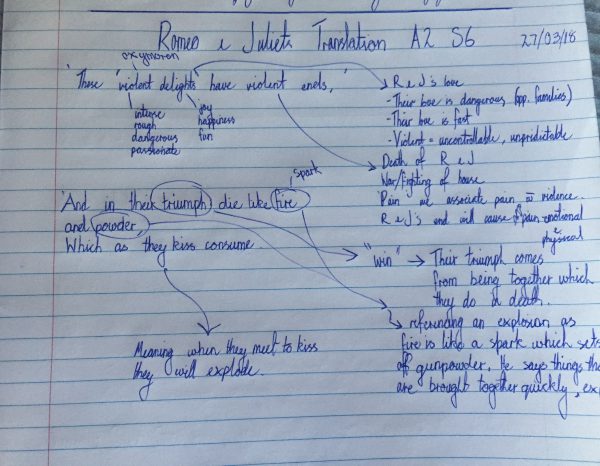Explain How Shakespeare Uses Literature and/or Language Devices to Express the idea of ‘Fate’ in Romeo and Juliet.
Fate. An uncontrollable (by humans) occurrence of events happening, usually considered to be caused in the presence of supernatural power. The idea of ‘fate’ is frequently referenced within Shakespeare’s play, Romeo and Juliet, through a variety of literature and language devices. The play displays a story of star-crossed lovers destined for misfortune.Through expression of; metaphors, plot and foreshadowing, Shakespeare manipulates the conceptual understanding and intention surrounding fate in his centuries-old, yet still historically significant, play.
“O, I am fortunes fool!” Quoted from Act 3 Scene 1, Romeo declares luck is defying him as Tybalt lies dead and Mercutio stresses the importance of Romeo fleeing the crime scene. The notion of fate influencing events surfaces once the metaphor is spoken. “Fortune” refers to luck or chance which links with this idea of ‘fate’. Similarly to fate, luck is an uncontrollable factor influencing outcomes. Character dialogue in Romeo and Juliet contain many language devices which speak of ‘fortune’ or ‘the stars’. These devices demonstrate superstitious beliefs circling society during the Shakespearean era. Metaphors, a language device which refers to a characteristic being applied to an idea that is not realistic, reinforces the recurring theme of fate causing events to happen. This is supported by the quote “O God, I have an ill-divining soul” – Act 3 Scene 5. Shakespeare displays Juliet relating her ‘evil’ predictions to fate through mentioning “God”. This strengthens the idea of ‘fate’ as God was believed to control a persons future, connecting to fate because fate was known to occur in the future. This in-turn expresses evidence of beliefs held beneath Juliet’s and consequently Shakespeare’s structured society.
Fate is again subtly mention within the domino-like plot and classified as ‘Acts of God’. Plot, a literary device which describes the plays structure or layout (in the context of the play), represents the religious perspective held by most in the time period. This faith centres around believing incidences such as The Black Plague and fortunate timing were an ‘Act of God’. Act 1 Scene 2 details a servant sent to deliver invitations he can’t read which demonstrates the idea of ‘fate’ in the scene and not directly in the characters dialogue. “But I am sent to find these persons whose names are here writ, and can never find what names the writing person hath here writ.” As Romeo ‘happened’ to overhear the servants troubles and come to his aid, Romeo was invited to the ball. This fortunate timing leads to reasoning it was ‘God’s will’ as many alternatives could’ve been derived from other circumstances. Once again gods hand comes into play in Act 3 Scene 2, as Friar Lawrence questions Friar John on the whereabouts of the letter which he sent to Romeo detailing Juliets actions. His reply was, ‘I could not send it – here it is again – Nor got a messenger to bring it thee, So fearful were thy of infection.” The talk of infection refers to the Black Plague which struck villages in irregularly outbursts and caused death in large numbers. As the society of the time couldn’t distinctly find its reason for occurring, they considered it an ‘Act of God’ and therefore fate. The plots purpose in Romeo and Juliet focuses around the image of fate and effects caused due to certain coincidental circumstances which evidently also effect subsequent events.
The act of foreshadowing involves revealing an event that hasn’t yet occurred and also indicates a purpose behind said event, enhancing its climax. ‘Fate’ is reflected in the process, shown in the opening lines of Romeo and Juliet, a prologue is spoken by the Chorus detailing a strong example of foreshadowing. It says as follows, “From forth the fatal loins of these two foes A pair of star-cross’d lovers take their life”. When the phrase “star-cross’d” is presented, an element of fate is identified. Stars were thought to be directors of fate and your destiny could be ‘written in the stars’. By referencing ‘the stars’ and hence fate, an underlying theme is set and followed within the play. Romeo is also a victim to foreshadowing in Act 3 Scene 1 when stating todays misfortunate outcomes will affect later happenings and cause an end to horror in day ahead. “This days black fate on more days doth depend. This but begins the woe others must end.” Fate is openly mentioned in this quote, forcing the audience to believe fate plays a hand in the characters future. Foreshadowing expresses events greatly influenced by ‘fate’ and provides a text with subtle underlying meetings.
Romeo and Juliet has been analysed on numerous occasions throughout history and new meanings are continually being discovered and rediscovered. Although the purpose of Shakespeare’s famous play can be debated in favour of several different ideas, the expression of ‘fate’ is greatly experienced along the storyline through the use of metaphors, foreshadowing, plot and other devices. ‘Fate’ occurs in many individual and extended segments which form a relationship between; the texts meaning, fate and language or literal devices.

 Busy City
Busy City